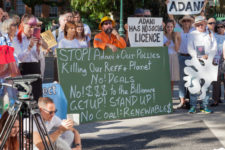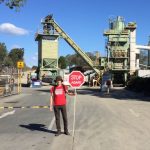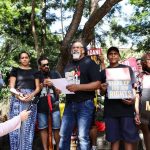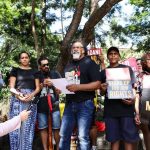The Adani Mine: Morrison, Albanese and the Growing Rebellion

Queensland premier Annastacia Palaszczuk was completely right last week when she remarked in regard to the Adani mine that “everyone’s had a gutful”. But, most Australians aren’t feeling it in the bend-over-backwards-to secure-the-mine-opens sort of way that she is.
The growing number of climate conscience Australians have had a “gutful”, as they don’t want to see the Indian mining giant in the Galilee basin, along with the five or six other mines set to follow once the infrastructure and possibly government-funded rail line are in place.
But, you’d have to be living in a remote part of the Munga-Thirri/Simpson Desert not to see the link between the pro-coal Liberal Nationals government taking out the federal election and Queensland Labor now flooring it to secure the passage of the mine.
Meanwhile, many voters are only just waking from their post-election shellshock to find the touted “climate election” resulted in the return of a coal-wielding yes-man, an opposition now hellbent on sidling up to him, and a potential three more years of climate emergency inaction.
Securing sacred land
As former Australian Greens leader Bob Brown led the Stop the Adani Convoy in the lead up to the election, he pointed out that Carmichael will lead to more mines, but Adani’s proposed use of automation won’t lead to more jobs. And now some are strangely claiming he’s behind Labor’s loss.
But, what’s closer to the truth is that it was Clive Palmer’s $60 million campaign – with a United Australia Party candidate in every electorate – that turned voters against the left. While his party secured no seats, it sent all its votes in the Liberals’ direction, helping them across the line.
Palmer told the ABC last week that during the election he shifted focus to run a campaign against Labor to knock the party out, rather than concentrate on winning seats. But, in him saying that, it’s highly likely that was always the aim: trying to guarantee the opening the Galilee Basin.
And the mining magnate now awaits federal government approval for his Alpha North coal mine project, which is supposed to not only neighbour Adani’s mine in the basin, but it will also produce more coal than it. The mine’s viability relies a rail link into the area being established first.
Gravitating to the centre
Although, apart from Palmer, it would seem that Labor itself might bear some of blame for losing the unlosable election. It was a party that spoke on climate – the most important issue according to polls – yet it sat on the fence on Adani and spruiked fracking in the NT.
Of course, the election wasn’t solely fought on climate emergency. From the result, it can be seen that it was actually decided on the opposite. But, if Labor had presented a strong oppositional voice based on both climate and a “just transition”, it could have taken what was there for the taking.
Now, left-wing Anthony Albanese is taking the Labor leadership role spouting centrist rhetoric. Last week, he announced that he’s set to drop the party’s anti-business posture, as well as its class war rhetoric, meaning he’s steering towards the right.
The new leader criticised those who blanketly oppose Adani during the election, while on Monday he stated that he’s willing to work with the coal-obsessed Morrison on climate change. This all points to more climate inaction, no meaningful opposition, as well as ensuring business as usual.
With god on his side
Morrison believes that his election to the position of top minister was a miracle. And he’s likely to perceive that the Adani coal mine is on the heavenly agenda as well. Indeed, with this line of thought, the whole climate emergency could be taken as an act of providence.
Looking back at his past actions from this angle, appearing in federal parliament with a lump of coal can be seen as a stroke of genius. And his government putting the pressure on the CSIRO to sign off on the last federal barrier to the Adani project prior to the election was all part of the plan.
And with Palaszczuk now having set a deadline for the two last environmental approvals to be finalised within the next three weeks, another Coalition government venture that prioritises making a quick buck over preserving the planet has almost come to fruition.
Mobilising from the outside
“We never really had any faith in politicians dealing with the crisis itself,” said Adam Hastie, a coordinator of the Extinction Rebellion NSW. “If you look at the last 50 years, since we’ve known about climate change, they haven’t acted… on both sides of the aisle.”
The Extinction Rebellion rose to prominence in April when its members peacefully shutdown major thoroughfares in London for over a week. The global movement states that it’s a response to the mass species extinction and societal collapse gripping the Earth.
And while governments like the Liberal Nationals continue to steer the ship in the opposite direction of averting climate breakdown, it’s every citizens’ “moral duty to rebel” in order to save the planet for future generations.
Mr Hastie told Sydney Criminal Lawyers that acts of civil disobedience are key in forcing governments to act on environmental collapse. And he added that its actions taken outside of the usual “organised political systems” that will bring about the needed change.
From the bottom up
“I don’t believe that Albanese is going to do anything about it,” Mr Hastie continued, after already ruling out any climate action stemming from Morrison. “But, I do believe that power will cede if there are demands made. So, that’s what we’re here to do. We’re here to make demands.”
Hastie pointed to historical precedents to support the Extinction Rebellion’s position. He said when it has come to large societal upheaval, “meaningful change” has risen from the grassroots, not the political elite. This is evidenced in the rise of the civil rights, women’s and labour movements.
“At those times, we’ve been able to move the system from a position of inaction to action,” Hastie concluded. “The climate change movement is no different. If we’re going to solve a crisis this big, it requires a mass mobilisation. And so that’s what we’re here for.”







